Departmental news
New programme launches in Westminster which aims to put the UK at the forefront of hydrogen innovation
An initiative which is designed to support and foster the creation of a new hydrogen economy in the Midlands has been formally launched at the House of Lords, to an audience of MPs, peers, businesses, academics and senior civil servants.
‘HyDEX’ brings together the university partners in the Energy Research Accelerator (ERA), including WMG at the University of Warwick, with multinational businesses, SMEs and other partners, in order to accelerate innovation in hydrogen, build markets and the supply chain, and support the skills needed for the new hydrogen economy.
The aim of HyDEX is to address the challenge of building a thriving new business, industrial and manufacturing sector in hydrogen, where very little currently exists. The programme allows businesses to accelerate the development and viability of new hydrogen products and associated intellectual property, while supporting the transition from declining industrial sectors and enabling the training and re-skilling required.
The £4.99 million, three-year programme, funded via the RED Fund scheme and run by Research England (part of UK Research and Innovation - UKRI), will see the ERA university partners making available their £111m worth of hydrogen facilities, large scale demonstration programmes, and research capabilities to regional businesses.
HyDEX is being supported by the expertise of leading industrial partners in transport, heating and manufacturing technologies, these include Worcester-Bosch and Cadent (hydrogen boilers and gas networks); Intelligent Energy (fuel cells); Toyota (hydrogen vehicles); FAUN Zoeller (heavy vehicles); Cenex, EQUANS (Hydrogen Networks); Progressive Energy, ITM Motive (hydrogen generation and transport respectively); Siemens and ENGIE (hydrogen production and storage).
The universities involved in the programme include Keele (project lead), Aston, Birmingham, Cranfield, Loughborough, Nottingham and Warwick. Civic partners such as the Midlands Engine, LEPs, local government and local authorities, will also add their weight to support the creation of a market for low-carbon hydrogen solutions as part of the net-zero transition.
There is also an international dimension to HyDEX, which is facilitating links with growing international markets in countries such as China, Australia and South Korea, where ERA partners have strong connections, in order to build commercial opportunities that reach beyond the Midlands and the UK.
The event at the House of Lords on Wednesday 15th June included presentations from Lord Teverson, Professor Trevor McMillan, Vice-Chancellor of Keele University, Professor Martin Freer Director of the Energy Research Accelerator, and Dennis Hayter, Vice-President of Intelligent Energy.
Speaking about HyDEX, Professor Trevor McMillan, Vice-Chancellor of Keele University, which is leading the programme, said: “We are very excited to be launching the HyDEX programme and leading it from Keele University. At Keele we have been leading the way in researching the use of hydrogen in the domestic gas heating system and in smart energy systems.
“This experience and expertise, when combined with the wealth of knowledge in the ERA partnership and our collaborators will enable HyDEX to make a significant impact on the use of hydrogen in the future.”
Professor Martin Freer, Director of the Energy Research Accelerator, added: “The ERA universities have invested significantly in hydrogen infrastructure, creating an array of great facilities and demonstration projects. The HyDEX programme will see experts from our universities, working with Midlands’ businesses to use these facilities to develop new, innovative products.”
Dr Sharon George of Keele University, Principal Investigator for HyDEX, commented: “I am looking forward to leading the HyDEX programme. It will be a great challenge - we are seeking to support the building of a hydrogen economy where one currently doesn’t exist. I am confident that with our academic, industrial and public sector partners, we will be able to demonstrate the commercial potential of hydrogen technologies, support businesses to create products, and build the skills base needed to support the transition to hydrogen.
 Alok Choudhary, Professor of Supply Chain Management and Head of Supply Chain Research Group, at WMG, University of Warwick said, “We are thrilled to be working with the HyDEX group of Midlands universities, businesses, and international partners. At WMG, our work stream will focus on establishing and strengthening the supply chain of hydrogen production, developing business models, and ensuring its sustainability for transitioning to the hydrogen economy in specific sectors. The UK government's Hydrogen Strategy is a significant step in the low carbon hydrogen development and is central to the UK's net zero strategy."
Alok Choudhary, Professor of Supply Chain Management and Head of Supply Chain Research Group, at WMG, University of Warwick said, “We are thrilled to be working with the HyDEX group of Midlands universities, businesses, and international partners. At WMG, our work stream will focus on establishing and strengthening the supply chain of hydrogen production, developing business models, and ensuring its sustainability for transitioning to the hydrogen economy in specific sectors. The UK government's Hydrogen Strategy is a significant step in the low carbon hydrogen development and is central to the UK's net zero strategy."
Dennis Hayter, Vice President of Intelligent Energy, said: “For Intelligent Energy and the other business partners involved in the programme, HyDEX provides a unique opportunity for us to develop and test our technologies and prove the worth of hydrogen as a crucial green energy source for the UK and world, as we transition to a net-zero society.”
More details about HyDEX can be found at: http://www.hydex.ac.uk/
ENDS
For more information about this press release, please contact Nick King, Marketing and Communications Manager for the Energy Research Accelerator on 07974 690632 or email mailto:nick.king@era.ac.uk
About the Energy Research Accelerator (ERA)
ERA consists of the partner universities of Midlands Innovation (Aston, Birmingham, Cranfield, Keele, Leicester, Loughborough, Nottingham and Warwick), and also the British Geological Survey (BGS). ERA aims to harness the Midlands’ combined research excellence and industry expertise to play a critical role in tackling some of the biggest challenges facing the UK. Via Innovate UK, the government committed an initial capital investment of £60m, and ERA has secured additional co-investment of £120m. This has been invested in 23 state of the art facilities which are being used by university and industrial researchers to develop new energy innovations.
Specialist electric motorcycle project hailed a great success
 Today (Tuesday 12th July 2022), marks the official completion of the Triumph TE-1 electric development project, a unique four-way partnership between WMG at the University of Warwick, Triumph Motorcycles, Williams Advanced Engineering and Integral Powertrain Ltd e-Drive Division.
Today (Tuesday 12th July 2022), marks the official completion of the Triumph TE-1 electric development project, a unique four-way partnership between WMG at the University of Warwick, Triumph Motorcycles, Williams Advanced Engineering and Integral Powertrain Ltd e-Drive Division.
The TE-1 project was funded by the Office for Zero Emission Vehicles through Innovate UK, and was set up to create ground-breaking developments in specialist electric motorcycle engineering and innovative integrated technology design. The project provides an input into Triumph’s future electric motorcycle offering, driving innovation, new standards, capability, and new intellectual property, whilst enhancing the credibility and profile of British industry and design.
Driving lower environmental impact transportation, and delivering against the UK’s focus on reducing emissions, the project also aimed to develop strong, commercially viable and sustainable partnerships with UK industry manufacturers and supply chains, whilst building expertise and capability within the UK workforce.
Nick Bloor, CEO, Triumph Motorcycles, said: “We are incredibly proud to be able to share such positive outcomes from the completion of Project Triumph TE‑1, where the prototype demonstrator has exceeded many of our initial targets and expectations. Everyone on the team is thrilled with the results we have achieved with our partners, and how the outcomes of the project will feed into the electric future to come from Triumph.”
Released today, the final testing results show how the TE-1 prototype has delivered on all targets and objectives following an extensive live testing programme which involved numerous assessments of the bike’s performance on a rolling road as well as on track.
WMG’s role in the project was to provide electrification expertise, and the critical vision to drive innovation from R&D to commercial impact, through modelling and simulation based on future market needs.
Highlights from the testing results include a standing start acceleration of 0-60mph in 3.6 seconds, peak power of 130kW (177PS / 175bhp) as well as peak torque of 109Nm (80 lb-ft), a 20-minute charge time (0-80%) and a 161km / 100-mile range based on official testing and projections. At 220kg (485 lb), the TE-1 prototype is also lighter than the equivalent electric bikes available currently by up to 25%.
20-minute charge time (0-80%) and a 161km / 100-mile range based on official testing and projections. At 220kg (485 lb), the TE-1 prototype is also lighter than the equivalent electric bikes available currently by up to 25%.
Professor David Greenwood, CEO of the High Value Manufacturing Catapult at WMG, University of Warwick, explained: “To meet our ambitious emission reduction targets in the UK we will have to rethink the way we travel, not only transitioning from ICE to electric propulsion vehicles, but also encouraging a modal shift away from private cars. Electric two wheelers have a pivotal role to play in the transport revolution as a zero-tailpipe emission option.
“In our partnership with Triumph, WMG used our research experience in electrification to demonstrate manufacturers can deliver products with a lower emission burden as well as outstanding performance-offering customers an EV that is great fun to ride.”
Read more about WMG’s Transport Electrification research here: Energy (warwick.ac.uk)
UK closer to net-zero steel thanks to new WMG and Tata Steel partnership
More sustainable, low-carbon steel and electric vehicle batteries are the target of a new two-year technology development programme between WMG at the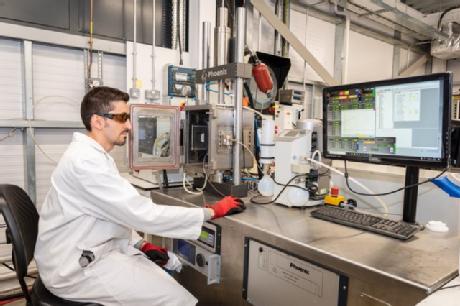 University of Warwick and Tata Steel, as part of the High Value Manufacturing Catapult.
University of Warwick and Tata Steel, as part of the High Value Manufacturing Catapult.
The two major partners will come together to focus on developing new environmentally-friendly steel grades, coatings, films, and battery structures – enabling the growth of steel application across key industrial sectors as the UK advances towards a net-zero future.
This partnership builds on the long-standing relationship between both parties and will see them collaborate to make steel cleaner, greener and more responsive to the fast-changing needs of customers across a variety of sectors.
Researchers, led by Professor Claire Davis, at WMG, University of Warwick, will be working alongside experts at Tata Steel in the UK to translate and apply outputs from the early-stage research across key UK manufacturing priority areas including advanced materials and light-weighting, electrified propulsion system applications, digital manufacturing and net-zero manufacturing including circular supply chains.
The initial research activity will be focused across five core themes: Product metallurgy; Surface state optimisation; Non-metallic coatings; Future material applications and Material forming/joining and associated characterisation.
Professor David Greenwood, CEO of the High Value Manufacturing Catapult at WMG, University of Warwick, explained, “WMG has worked with Tata Steel on projects for many years, and this partnership will see the collaboration grow across key research themes, including decarbonising the supply chain and enabling future applications of steel across zero carbon propulsion systems and transport vehicles. This activity will include identifying new collaborative relationships and developing world-class technology for the future of the UK steel industry.”
on projects for many years, and this partnership will see the collaboration grow across key research themes, including decarbonising the supply chain and enabling future applications of steel across zero carbon propulsion systems and transport vehicles. This activity will include identifying new collaborative relationships and developing world-class technology for the future of the UK steel industry.”
Dr. Sumitesh Das, Director of R&D, Tata Steel, explained: “This is a critical partnership for us to help support new product development with low carbon footprints across various market segments. It also strengthens our ongoing work including building technology capability and expertise in the UK in manufacturing.”
-ENDS-
Notes to Editors
Press Contacts:
Simmie Korotane. Media Relations, University of Warwick, Email: mailto: Simmie.korotane@warwick.ac.uk
Tim Rutter, Head of Public Relations, Tata Steel UK, M: +44 (0)7850 990755, E: mailto: tim.rutter@tatasteeleurope.com
Battery tech pioneer Britishvolt strengthens partnership with WMG, University of Warwick, to ramp up UK electric vehicle battery production
- The multi-million-pound [£] project with WMG, University of Warwick, is pioneering battery technology in the UK
- Research from WMG, University of Warwick, will help Britishvolt to ramp up the availability of batteries for electric vehicles, and other applications, in the UK and beyond
- The project is accelerating Britishvolt’s business plan to deliver a 38GWh battery Gigaplant, one of the largest industrial investments ever undertaken in the UK
- Britishvolt recently announced exciting plans for a scale-up production centre in the epicentre of the automotive industry located at Hams Hall, West Midlands, creating what it calls a “Battery Corridor” – linking the Northumberland site with the UK’s automotive heartland
- The Gigaplant will build enough cells each year for well over 300,000 electric vehicle battery packs, equivalent to [c]25% of current UK vehicle manufacture, securing Global Britain’s position on the sustainable battery production map
WMG has partnered with leading sustainable, low-carbon battery manufacturer, Britishvolt on a two-year multi-million-pound project which is pioneering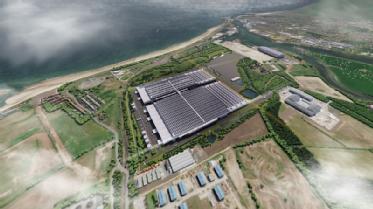 battery technology in the UK.
battery technology in the UK.
More batteries for electric vehicles will become available in the UK thanks to research from WMG, at the University of Warwick and its partnership with battery tech pioneer Britishvolt.
The project is helping Britishvolt to deliver a 38GWh battery Gigaplant, one of the largest industrial investments ever undertaken in the UK. The facility, located in the North-East of England, will quickly increase the availability of batteries required at commercial scale for the electric vehicle market – playing a key role in helping the UK reach its carbon net zero target by 2050.
Following an initial 12-month project, Britishvolt and WMG are now embarking on a two-year programme of work. WMG’s research will assist with battery cell development and optimisation including small-scale manufacturing to produce battery electrodes and cells using Britishvolt target materials sets, formulations and cell designs. These will then be tested according to Britishvolt’s agreed protocols.
Professor Dave Greenwood, CEO of the High Value Manufacturing Catapult at WMG commented: “WMG is delighted to be supporting Britishvolt as they set up large scale battery manufacturing and research facilities in the UK. This industry will be critical for the future of the UK automotive and energy sectors. WMG has been investing over the last decade in the research and development capabilities needed to help Britishvolt and other battery companies to be internationally competitive now and in the future”
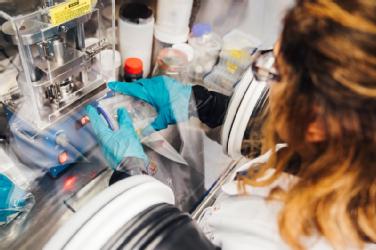 Dr Allan Paterson, Chief Technical Officer, Britishvolt, concluded: “Britishvolt are delighted to extend and expand our relationship and programme of work with WMG. The battery science, advanced materials and cell prototyping expertise and capability at WMG has directly, and positively, supported our battery technology development programme. This gives us not only an excellent basis to progress from, as we seek to scale and commercialise our technologies, but the relationship also enables Britishvolt to continue to develop our products further, as we continually strive to deliver best-in-class, market-leading, cell technologies to our customers.”
Dr Allan Paterson, Chief Technical Officer, Britishvolt, concluded: “Britishvolt are delighted to extend and expand our relationship and programme of work with WMG. The battery science, advanced materials and cell prototyping expertise and capability at WMG has directly, and positively, supported our battery technology development programme. This gives us not only an excellent basis to progress from, as we seek to scale and commercialise our technologies, but the relationship also enables Britishvolt to continue to develop our products further, as we continually strive to deliver best-in-class, market-leading, cell technologies to our customers.”
Britishvolt: Power with Purpose
The Northumberland Gigaplant – Britishvolt’s first large, full-cycle Gigaplant in the UK - will have a total capacity of over 38 Gigawatt Hours by the end of the decade and will produce enough cells far in excess of 300,000 electric vehicle battery packs per year, intended primarily for use in the automotive industry. The development is a major boost for Northumberland, and the UK, delivering around 3,000 direct skilled jobs and another 5,000-plus in the associated supply chains.
Britishvolt’s collaborations with academia, industry and private enterprise will also help transition the UK from fossil fuels to a low carbon, battery-based electric future.
The release of an official A-sample battery cell to customers, which is scheduled later in 2022, will help to further accelerate commitments.
Britishvolt recently announced that it will develop its UK battery cell scale-up facility in the West Midlands, home to the internationally renowned battery ecosystem With a budget exceeding £200m, the plan looks to create upwards of 150 highly skilled, well-paid jobs; unifying the Britishvolt Northumberland Gigaplant with a centrally located scale-up/technology hub
The Hams Hall site will spearhead new cell formats and electro chemistries to create higher performance, production ready, batteries of the future whilst helping lower cell costs for more affordable EVs, aiding mass adoption
Britishvolt is one of the fastest growing battery technology companies in Europe and globally. The company is also in discussions with the Canadian Government regarding its expansion plans in the country.
Watch Britishvolt’s Battery Research video: https://www.youtube.com/watch?v=3UlDcUjMhiE
WMG supports Norton Motorcycles as they announce plan to build electric motorcycles in the UK
WMG, at the University of Warwick, is supporting Norton Motorcycles in its intention to begin developing electric motorcycles in the UK after winning significant investment through a government scheme.
through a government scheme.
The iconic British motorcycle brand has been awarded funding by Advanced Propulsion Centre (APC) 19, an initiative which aims to assist businesses in the automotive sector in advancing their low-carbon offering while helping to accelerate the UK towards a net-zero automotive future, a future that Norton fully embraces.
As demand for electric motorcycles and micro-mobility solutions grow, the project, Zero Emission Norton, will expand Norton’s ever-growing electric vehicle engineering capabilities and develop world class electric motorcycles.
To deliver this ambitious project, Norton will work with specialist project partners who have the same vision for innovation in production of world-class electric motorcycles. The team encompasses Delta Cosworth, HiSpeed Limited, Formaplex Technologies, M&I Materials, INDRA and academic partner WMG at the University of Warwick.
Each partner on the project will have a specialist part to play in project Zero Emission Norton. Delta Cosworth will design the battery pack, while HiSpeed Limited bring motor design and manufacturing skills. Formaplex Technologies have expertise in precision composites manufacturing and M&I Materials will support on applications of dielectric cooling oils. INDRA specialise in vehicle to home charging technology and WMG major on battery technology, modelling and toolchain development.
Norton will work alongside these partners to develop world-class technology and products that will enhance the UK supply chain for all the critical components in electric vehicle (EV) technology including batteries, motors, chassis, cooling oils and vehicle to home chargers.
As a result, the 30-month project is expected to create a significant number of jobs in the UK in manufacturing and R&D as well as upskilling existing staff to be capable of electric motorcycle engineering. This in turn will help address the UK skills shortfall in that space while returning the UK to the position it last enjoyed in the 60’s, as the global technology leader for motorcycles.
Andrew McGordon, Reader, Energy Applications Group at WMG, University of Warwick, said: “WMG is excited to be a partner in this project exploiting our research in battery and systems modelling to develop a zero-prototype modelling and validation methodology, including predictive smart charging and Vehicle to Grid technology. We will bring extensive electrification experience to this project having worked across many sectors already.”
Robert Hentschel, CEO Norton Motorcycles commented: “This significant funding investment is a momentous milestone for the brand as it marks the beginning of our electrification journey and fulfilling our ten-year product plan.Norton is an exemplar of modern luxury and unafraid to challenge the status quo, innovating for the future of mobility while staying true to our British heritage. It also brings into focus our desire to support the UK in its mission for a net-zero automotive future.
“Working alongside our world class partners, we’re confident that project Zero Emission Norton will eliminate the current dispute between a conventional and electric motorcycle to create EV products that riders desire – motorcycles that blends Norton’s uncompromising design DNA with racing performance, touring range and lightweight handling.”
Ian Constance, Chief Executive of the APC said: "The projects receiving today’s investment highlight the breadth of technologies needed to help the UK accelerate to net zero emissions. They’re reimagining not just vehicles, but transport in general.
"Norton are an iconic British brand with a proud history. From making motorcycles to support the second world war effort to developing the world’s first production superbike, they are now looking to the future with an electric bike that will deliver both performance and range radiating from a UK manufacturing base and strengthening highly-skilled jobs and green growth."
Ends
For any enquiries, please contact Stephanie Staff at Performance Communications on
07798 897 692 or email norton@performancecomms.com
Website: www.nortonmotorcycles.com
Carbon, cost and battery conditioning benefits calculated for vehicle-to-grid chargepoints
Vehicle-to-grid chargepoints can improve battery life in electric vehicles and reduce carbon emissions and costs of charging, a government-funded project has found.
Research from the EV-elocity project shows that, by careful charging and discharging, EV battery degradation can reduce by one-eighth, and, in some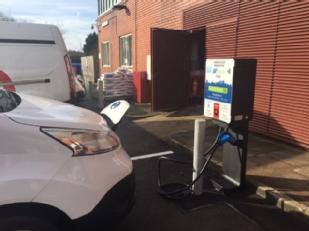 situations, up to 450 kg of emitted carbon dioxide (CO2) or £400 could be saved per vehicle each year.
situations, up to 450 kg of emitted carbon dioxide (CO2) or £400 could be saved per vehicle each year.
Vehicle-to-grid (V2G) can balance the calendar and cycling aging (both of which affect the rate of battery degradation) to optimise the battery condition and improve its health by 8.6 – 12.3% over one-year’s operation, compared to conventional charging alone - equivalent to one extra year of use.
In cost-terms, V2G tariff optimisation can save around £100 per year per charge point on normal business electricity tariffs, with up to £400 saved on a smarter tariff.
If managed to maximise the environmental benefit, nearly half a tonne of annual CO2 emissions can be saved, and significant savings (over 180 kg) can be made even when reducing cost is the main goal.
Chris Rimmer, Infrastructure Strategy lead at Cenex and the project’s lead project manager, said: “Our conclusions show that it is not necessary to trade-off financial, environmental and asset lifetimes when charging Electric Vehicles. Cost, carbon, and conditioning benefits can all be gained when V2G is used intelligently with fleet vehicles.”
Professor Lucelia Rodrigues of the University of Nottingham added “a key challenge for an optimum application of V2G technology is to synchronize the needs and requirements of the users and the energy and transport systems. Our work correlated variables such as user needs, mobility patterns and renewable electricity generation to evolve different possible scenarios for the application of V2G chargers, with a view of maximizing local renewable energy consumption, lowering costs for the user, improving battery life and reducing carbon emissions from the whole system.”
“Our experimental research highlighted the potential to extend battery life by exploiting the unique capability of V2G chargers to both charge and discharge the vehicle battery”, commented Professor James Marco of WMG, University of Warwick. “By careful optimisation of this process and knowing how the battery performance may degrade over time, it is possible to condition the battery to extend its life in a number if situations when compared to conventional methods of vehicle charging.”
The EV-elocity Project was funded by Innovate UK, the Department for Business, Energy and Industrial Strategy, and the Office for Zero Emission Vehicles between September 2018 and January 2022; it was led by Cenex and comprised CrowdCharge, Leeds City Council, Nottingham City Council, University of Nottingham and University of Warwick in a second phase from January 2020.
The project deployed 15 chargepoints across nine sites - including West Midlands Police, Leeds City Council and the University of Nottingham Creative Energy Homes campus. Two of charger from eNovates and Nichicon were managed by a technology-agnostic operating system, demonstrating V2G across the different trial sites within the UK.
The final report presents the findings and lessons learned for future vehicle-to-grid deployment.
Ends
Notes to editors:
The EV-elocity project is part of the Vehicle-to-Grid (V2G) competition, funded by the Department for Business Energy and Industrial Strategy (BEIS) and the Office for Low Emission Vehicles (OLEV), in partnership with Innovate UK, part of UK Research and Innovation.
In January 2018, OLEV and BEIS announced that 21 projects (8 feasibility studies, 5 collaborative research and development projects, and 8 real-world v2g trial projects) were to receive funding of £30m to develop the business proposition and the core technology to support Vehicle 2 Grid deployment in the UK, including its demonstration with large scale trials.
The projects involve more than 50 industrial partners and research organisations from both the Energy and Automotive sector, marking the largest and most diverse activities on V2G in the world, and trialling more than 1,000 vehicles and V2G charger units across UK.
The V2G projects represent a significant step towards the transition to a low carbon transportation and a smart energy system. Allowing EVs to return energy to the Power Grid when parked and plugged for charging, will increase Grid resilience, allow for better exploitation of renewable sources and lower the cost of ownership for EV owners, leading to new business opportunities and clear advantages for EV users and energy consumers.
Researchers develop technology solutions to enhance the safety and efficiency of connected and autonomous vehicles in complex road junctions
Researchers at WMG, University of Warwick have developed technology solutions for safer and more efficient automated driving when navigating complex road junctions such as roundabouts.
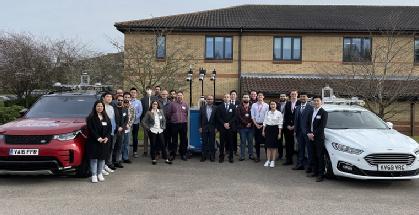 Working in partnership with Jaguar Land Rover, TRL and the University of Surrey, researchers from the Intelligent Vehicles directorate at WMG, University of Warwick have implemented a Proof of Concept demonstrator. This demonstrator focusses on unleashing the power of Edge and Cloud Computing, using a “connected roundabout” at the University of Warwick’s main campus.
Working in partnership with Jaguar Land Rover, TRL and the University of Surrey, researchers from the Intelligent Vehicles directorate at WMG, University of Warwick have implemented a Proof of Concept demonstrator. This demonstrator focusses on unleashing the power of Edge and Cloud Computing, using a “connected roundabout” at the University of Warwick’s main campus.
The Cloud Assisted Real-time Methods for Autonomy (CARMA) project, is part of the £11m TASCC programme funded by the Engineering and Physical Sciences Research Council (EPSRC) and Jaguar Land Rover. Supported by WMG’s Centre High Value Manufacturing Catapult, the CARMA project was established with the intention to create secure and resilient cloud-based platforms to enable safe and robust semi-autonomous functions on future cars in the short term, and with the vision of achieving fully autonomous vehicles.
Professor Mehrdad Dianati, Head of Intelligent Vehicles Research at WMG, University of Warwick said: “We expect autonomous vehicles to be much safer, much more efficient and much more comfortable than human driven vehicles. Unfortunately, with existing sensor and computing technologies, it is difficult and expensive to achieve the level of accuracy and reliability of the perception of the environment that’s expected.”
“CARMA not only demonstrates how these concepts could be implemented in practice, but also highlights what the impact of such technologies might be. This research will help manufacturers, technology developers, policy makers and road operators to make informed decisions on how they will adopt technologies in future road infrastructure, regulations, products and services.”
CARMA researchers installed eight infrastructure cameras, as off-board sensors, at the roundabout to monitor the environment and stream video to a base station called ‘Edge’. Using two-way communication, the Edge processes its own live information with information received from nearby connected vehicles. This processed data containing object, traffic, road layout and lane availability information is broadcast and received by the vehicles.
Dr Graham Lee, Principal Engineer at WMG, University of Warwick, added: “At complex road junctions, the CARMA platform can help enable on-road autonomy by providing additional real time data about the environment through the use of off-board sensors and computing. This gives vehicles the ability to navigate complex road junctions safely and efficiently.”
Dr Saber Fallah, Director of the Connected Autonomous Research Lab at the University of Surrey commented: “This technology enables new business models for the transportation system in alignment with the rise of shared mobility. In addition, autonomous vehicle technology also highlights the potential for how elderly people or disabled people can benefit from the joy of driving from point A to point B safely.”
The testing infrastructure was supported by the Midlands Future Mobility project, Innovate UK and the Centre for Connected and Autonomous Vehicles of the UK Government. The Open Innovation Platform research vehicle used within the project was developed with support from the High Value Manufacturing Catapult and used alongside the CARMA research vehicle provided by JLR.
Over ten follow-on projects have been inspired by CARMA, as technological, regulatory and business challenges are to be overcome before the concept can be deployed on a mass scale. Through the project 23 early career scientists and engineers were trained and three patents were granted along with 40 publications on the work carried out.
WMG welcomes Siam Cement Group
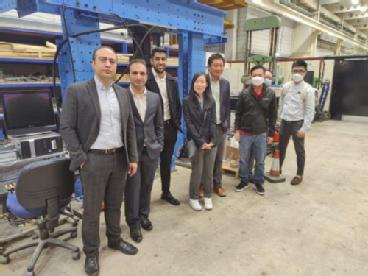 WMG and the School of Engineering at the University of Warwick were pleased to welcome Siam Cement Group (SCG) to campus recently.
WMG and the School of Engineering at the University of Warwick were pleased to welcome Siam Cement Group (SCG) to campus recently.
A senior delegation of directors at SCG, enjoyed an extensive tour of the University’s state-of-the-art facilities including WMG’s Advanced Materials and Manufacturing Centre (AMMC).
SCG, based in Thailand is one of the world’s largest cement and concrete manufacturers. The Group is investing in world-leading technology for construction including Concrete4Change. Concrete4Change is an award-winning R&D start-up, supported by WMG and the School of Engineering, developing net-zero concrete technology.
Dr Sid Pourfalah, Founder and CEO of Concrete4Change, and Honorary Associate Professor at the University of Warwick commented: “We are delighted to host SCG at the University of Warwick. The University has been an invaluable R&D partner in our journey so far, and with SCG now entering into collaboration with Concrete4Change, we can scale our presence in the market and create the true net-zero pathway that the concrete industry desperately needs.”
Read more about the Concrete4Change project here: CO2 consuming concrete technology showcased at COP26 to be tested at University of Warwick - WMG :: News
National Grid calls on support from the construction industry to improve wellbeing for workers
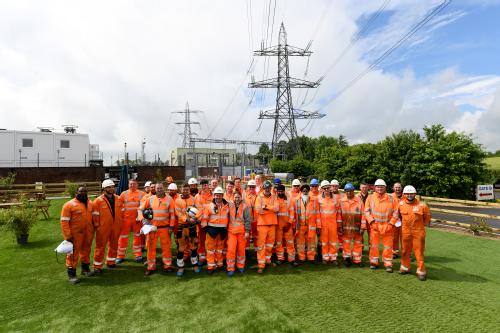 • Research shows 91% of construction workers have felt overwhelmed and 26% have experienced suicidal thoughts*
• Research shows 91% of construction workers have felt overwhelmed and 26% have experienced suicidal thoughts*
• National Grid issues call to join its Health in Construction Consortium to improve wellbeing of workers across the industry.
• National Grid opens new Health Hub at IFA interconnector site to provide wellbeing support for staff and contractors
National Grid is calling on the construction sector to work together to develop an industry-wide approach to improve the mental health and well-being of its workers.
Suicide rates for construction workers in the UK are over three times the national average with over two employees dying by suicide every day.
This highlights that wellbeing initiatives are not reaching the most vulnerable and more needs to be done to improve support and services offered within the sector.
There are a range of factors which make construction employees especially at risk of poor mental health including regular periods of underemployment, extended time spent away from family and friends and high mobility within the workforce. This has only been exacerbated through the pandemic.
According to research by CIOB, some 91% of workers report feeling overwhelmed and 26% have experienced suicidal thoughts. *
National Grid is determined to change this, by establishing a Health in Construction Consortium and leaders have called for supporters from throughout the sector to join the project.
The call to action was made at the official launch of a new on-site Health Hub at the company’s IFA interconnector site in Kent on Thursday. (19th May).
The facility has been specially designed to improve the wellbeing of construction workers and includes a canteen providing heathy meals, recreational space, a garden and a gym as well as a quiet room for prayer and reflection.
Services such as mental health and wellbeing sessions, training and support helplines will be provided by charity Lighthouse Construction Industry Charity which provides vital support for those working within the sector.
The facility, which has been constructed by contractor J Murphy & Sons Limited, is already providing vital services to hundreds of employees working around the clock at the company’s IFA interconnector.
Together with Considerate Constructors Scheme, National Grid has established a Health in Construction Consortium and will be sharing findings from this project across the industry to demonstrate the difference this kind of support can make to workers.
Managing Director of Interconnectors for National Grid, Nicola Medalova, said: “This is an issue that all of us in the construction sector have a responsibility to address. The research shows that something has to change. That’s why we’re looking for representatives from across the sector including small to medium-sized enterprise, large businesses, contractors, and clients, who are passionate about mental health, to be part of the solution. We understand that collaboration and coordination across key stakeholders in the industry will be critical to tackling the mental health crisis in construction. So, whether you are getting started, in development, or leading the way on mental health issues within the sector, we call for your support and ask for you to join us in being an agent for change.”
Considerate Constructors Scheme Chief Executive Amanda Long said: “As an industry, the workforce is at a higher-than-average risk of poor mental health and suicide and we must take action. It is vital that we work together with the construction sector to give all employees access to the support and facilities they need to look after their mental health and wellbeing.”
Chief Executive of Lighthouse Construction Industry Charity Bill Hill said: “We are absolutely delighted to be working with National Grid on this significant issue within our industry. It is so important that we get the message of support to the 'boots on the ground' that we are there for them 24/7. If our workforce don’t know we are there for them we simply can’t help them in crisis. We are delighted to support National Grid’s Wellbeing Hub and I am convinced that this initiative will have a positive impact on workforce wellbeing and ultimately save lives.”
National Grid is working with WMG at the University of Warwick to research the experiences of construction workers using the Health Hub, and the benefits these additional services will have on employee mental wellbeing. The project is being led by Dr Carla Toro, Associate Professor in Digital Healthcare Sciences at WMG.
The research will help the business understand and make recommendations to the sector on the challenges that the construction workforce experience, and the kinds of wellbeing initiatives that could have a positive impact on quality of life and mental health.
Organisations interested in joining the Health in Construction Consortium should contact Alisha Baig by emailing alisha.baig@nationalgrid.com
*Source of Research: 2019 CIOB (The Chartered Institute of Building) Research & Survey: Understanding Mental Health in the Built Environment.
The University of Warwick supports RIFT Technology with a greener cost-effective electric motor
A cheaper and more environmentally friendly electric motor for electric vehicles is a step closer to market with the support of WMG at the University of Warwick.
WMG has provided valuable knowledge and expertise in developing a UK focused, cost-effective production and supply chain for RIFT (Reduced  Induction Field Torque) Technology’s development of RIFT-10; a design for electric motor drives that reduces copper and magnet weight reduction by around 50% and lower cost by 75%.
Induction Field Torque) Technology’s development of RIFT-10; a design for electric motor drives that reduces copper and magnet weight reduction by around 50% and lower cost by 75%.
The aim of the project was to help RIFT Technology; an R&D company bringing a product to market for the first time, advance RIFT-10 to a higher manufacturing readiness level (MRL 7), to get the motor closer to production, by rooting the supply chain in the UK, rather than abroad (given the disruption to supply caused by the pandemic) and supporting production of trial units.
WMG, is committed to delivering UK economic impact and achieving net-zero by supporting industry in accelerating new concepts to commercial reality. This supports the University of Warwick’s approach to sustainability - the Way to Sustainable – which focuses on the real-life implications of creating a sustainable future and the practical challenges of getting there - prioritising research expertise, sustainability in the curriculum, and developing solutions for the benefit of industry and society.
The team of experts at the University has facilitated the RIFT-10 project to deliver on creating revenue, jobs, CO2 reduction, and supply chain growth in the UK.
RIFT Technology has developed the RIFT 10-30 kW motor (RIFT-10) by taking an exciting innovation from their sister business (RIFT Actuators) and working with APC and the Niche Vehicle Network to get the motor to working prototype stage (installed on a G-Whiz). The novel electric motor configuration is proven to generate 10-30kW of power, torque from 0-400Nm and up to 10,000RPM as demonstrated with a prototype vehicle.
The RIFT 10 motor demonstrated unique advantages over conventional EV motors:
Environmental benefits of the project:
· The low sales cost and attractive features of RIFT-10 enable greater/earlier market adoption of EUV’s, resulting in a reduction of CO2 production over ICE vehicles.
· A RIFT-10 weight saving and efficiency over competing EV motor designs increase vehicle range, resulting in less energy usage over alternatives.
· With RIFT-10, equivalent power output is achieved using fewer raw materials (i.e., 85% reduced copper weight and ~85% reduced magnet volume), resulting in less earth material usage as well as fewer material costs.
· Less materials usage results in an estimated 75% reduction in CO2 produced during manufacture. Planned production efficiencies also lead to further CO2 reductions. An estimated 612,000 Tonnes of CO2 would be saved by year 5.
· Development of an EV motors supply chain in the UK for a UK and EU market reduces international shipping of components thus reduces related CO2 production.
Social benefits of the project:
· RIFT-10 creates/safe-guards 50+ much needed and good-quality manufacturing, sales, administration and R&D jobs in the Malvern area with an estimated X14 more UK jobs across the supply chain (over 5-years).
· Growth of RIFT-10 addresses the government’s priority area of ‘Smart Cities’ by allowing smart monitoring of vehicle fleets efficiency performance, usage and other data points. The use of the Internet of Things and resulting analysis can only be as strong as the data input. Traditional alternatives offer no smart functionality.
James Black, WMG Innovation Manager at the University of Warwick said, “The Covid-19 pandemic has been particularly difficult for SMEs and R&D-focused organisations that have previously relied on face-to-face networking events to find new partners, investors, and customers.
“WMG’s network means we’re in a great position to connect UK companies together to help them accelerate their product to the market, and we’re delighted that RIFT Technology has benefited from our extensive background for practical supply chain solutions that have delivered economic and societal value to the project.”
James O’Donnell, Technical Manager from RIFT Technology said, “As a research and development company bringing a product to market for the first time, RIFT Technology needed to bridge the gap between prototype and small-scale production. We had to answer difficult questions such as what to make and what to buy, high level questions such as how to develop a supply chain strategy and practical questions such as how best to select suppliers.
“With a unique blend of academic expertise and industrial experience from the University of Warwick, WMG’s Supply Chain and Operations Group were able to support us in our journey.”
The project took place during the pandemic, meaning several online workshops were carried out targeting topics such as strategic management, supplier selection and decision-making, and end-of-life strategies.
For further stories, click here.
ENDS
4 April 2022
